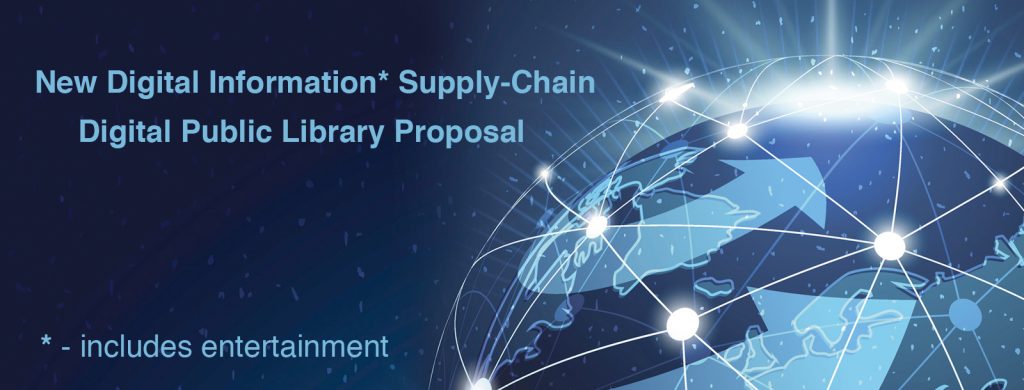I think I see a new way of promoting the Digital Public Library Proposal. It has to do with law.
In democracies the press is supposed to hold government accountable and the government is supposed to hold the press to be accountable. Neither institution is doing a very good job of policing the other.
We need to purge our systems of communication to rid them of hate, lies, advertising and surveillance.
We need to change the law so that private businesses should be liable for harms caused by content reproduced on their internet platforms. Public Libraries on the other hand should not. Changing this one detail of law will ignite the evolution of a new communication system that will function for the benefit of all.

The Americans passed a bad law in 1996. The Communications Decency act. The law creates a giant loophole for businesses providing interactive computer services, where they don’t have to be liable for any of the “shit” they make available through their services. That incredible privilege should only be allowed for public libraries. Now Article 19.17 of the USMCA (Trump’s New NAFTA) commits Canada too to giving private businesses “safe harbour” when publishing other’s content.
Because of that “safe harbour” law, publishing and amplifying hate and lies online has become a very lucrative business for interactive computer services, commonly now referred to as platforms.
Google, Facebook, YouTube, Twitter, Instagram would not exist without the 1996 American Communications Decency Act Section 230 which protects them from being held liable for publishing and amplifying information provided by another information content provider. How ironic. An act supposedly to govern communications decency has resulted in enabling an explosion of lies and rudeness in communications.
Canada and Mexico now have been locked into providing the same “safe harbour” provisions for internet platforms by signing on to Trump’s new NAFTA agreement: the USMCA, which includes Article 19.17 regarding Digital Trade.
Making profits from amplifying libellous misinformation and disinformation and enabling ill intentioned customers to profit at others expense using platform services is just plain wrong.
In Canada we must demand that we retain sovereignty over digital communications and that we be released from the conditions of Article 19.17 of the USMCA.
We need to remove this opportunity to profit by denying businesses “safe harbour” This will immediacy choke off the business of profiting from publishing and amplifying hate and lies online. Commercial platforms will not be able to deal with a mass of liable suits.
However there is a real need for everyone to be able to access digital content. A new Canadian Act will enable the development of public services to fill that need. It is being proposed that nonprofit publicly financed interactive computer services should be allowed “safe harbour” and private businesses not. We need an act like this —
Canadian Digital Communications Decency Act
1.) No Nonprofit, publicly financed interactive computer service which does not surveil or advertise to its users, shall be treated as the publisher or speaker of any information it provides but that is provided by another information content provider.
2.) Any for profit business providing interactive computer services shall be treated as the publisher or speaker of any information it provides that is provided by another information content provider.
The Digital Public Library* Proposal
Proposed that Canada enacts a Canadian Digital Communications Decency Act as above and that it brings in legislation to create and fund a new public communications service: The Digital Public Library*

- — * — Digital Public Library — a publicly financed interactive computer service that provides the public with access to digital content without surveilling the users and without exposing the users to third party advertising. As well as providing everyone with equal opportunity to access what exists, a Digital Public Library would automatically make payments for use to the content-owners of copyrighted content. Although payment is automatic, the user must have a manual option to reverse the automatic payment in cases where the user deems the content to be inappropriate or unworthy. This manual option for the user to be able to reverse automatic payments they triggered themselves, is a democratic and powerful way to discourage those who may wish to profit from deception.
Universally the Digital Public Library Proposal is rejected when it is pitched to journalists. To subscribe to this vision of a healthy communication system for society, is to face the fact that the whole community of active journalists, have totally missed a most important point. That point is that we cannot have a strong democracy that governs for the good of everyone and our planet, if we rely on the advertising industry and private publishing enterprises to finance social communications. In a world where wealth inequality exists, a communication system that provides the opportunity for the more wealthy to buy a bigger and louder voice for influencing and manipulating peoples commercial and political choices, will naturally expand the wealth gap and weaken democracy.
Other than this proposal, which no one knows about, there is no vision for a way forward to reform and democratize the communications systems. Consequently the journalists, the academics, and the politicians make do, try their best, and talk about regulatory solutions. The Digital Public Library Proposal is a systematic solution.
It is useful to discriminate between three types of digital media enterprises:
• Content-production enterprises
• Telecommunication carrier enterprises, and
• Content-access enterprises.
We can leave the production enterprises including of course news outlets and individual authors, remaining as they are; a mix of for profit enterprises and not for profit enterprises supported by public and private grants and donations.
Some say that it would be better to de-privatize the Telecom carrier services. This also could be accomplished by anti-safe harbour legislation.
Most importantly the arm of the media though which needs radical transition is the area of enterprise that provides access to digital content. We live in a moment where this very important service is totally monopolized by a few private enterprises. The Digital Public Library Proposal is about replacing them with a public service.
